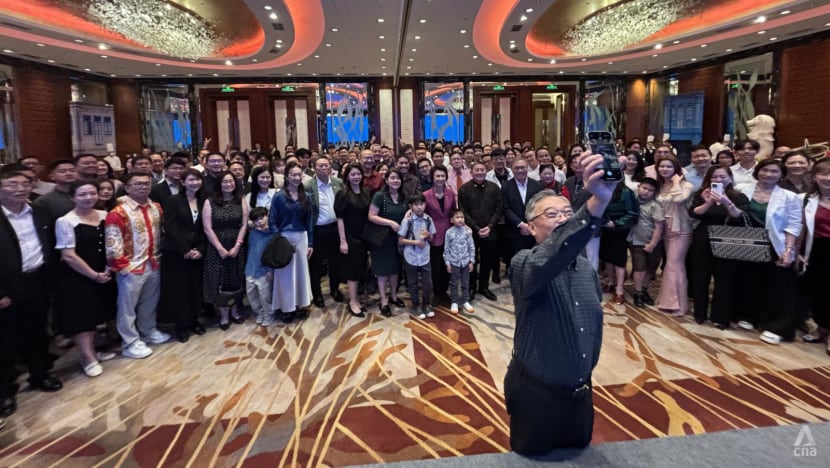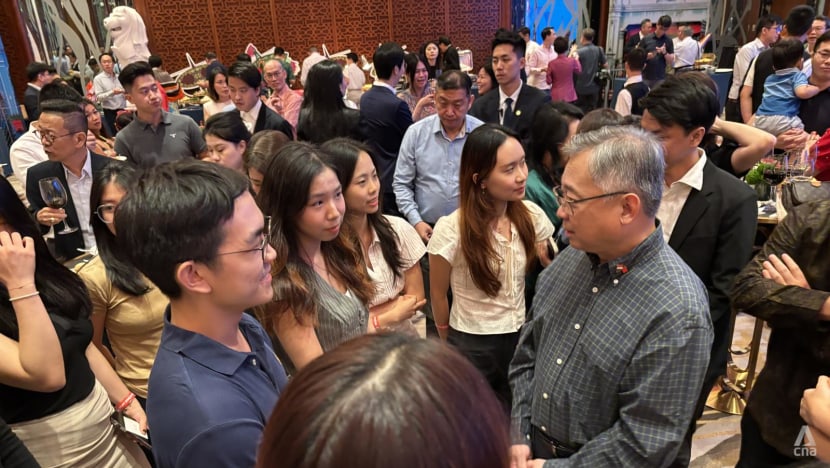Guangzhou Knowledge City useful testbed for tech, as Singapore, Guangdong expand cooperation: DPM Gan
Deputy Prime Minister Gan Kim Yong said Singapore is looking to deepen collaboration with Guangdong, its top Chinese provincial trading partner for 36 years.
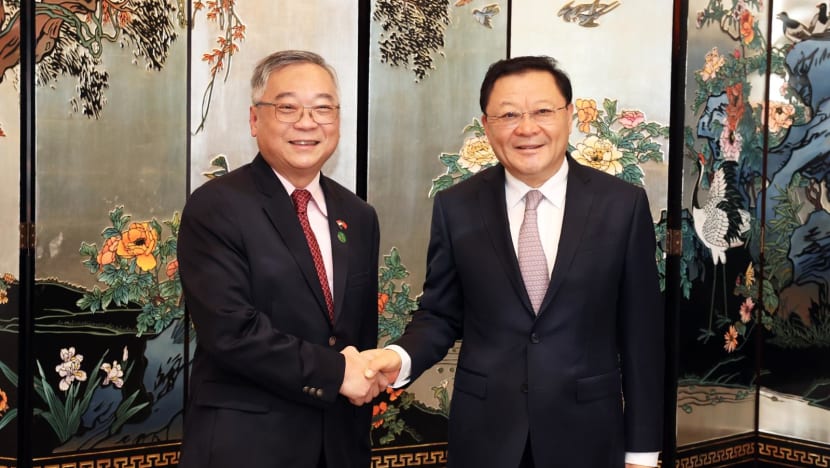
Deputy Prime Minister Gan Kim Yong meets Guangdong governor Wang Weizhong in Guangzhou on Sep 1, during his working visit to China. (Photo: Ministry of Digital Development and Information)

This audio is generated by an AI tool.
GUANGZHOU/SHENZHEN: Singapore is looking to deepen collaboration with China’s Guangdong province in areas such as trade, investment, culture, and sports, as well as through the China-Singapore Guangzhou Knowledge City (CSGKC), which marks its 15th anniversary this year, said Deputy Prime Minister Gan Kim Yong.
Mr Gan, who is also the Minister for Trade and Industry, met Guangdong governor Wang Weizhong on Monday (Sep 1) as part of his working visit to China from Aug 31 to Sep 4, with stops in Guangzhou, Shenzhen and Beijing.
“It is a good opportunity for us to relook at the direction of where the China-Singapore Guangzhou Knowledge City should be going,” said Mr Gan.
Mr Wang also proposed further collaboration between Guangdong and Singapore, including in trade and investment, tourism and sports, as well as “new quality productive forces” like artificial intelligence (AI) and robotics.
He highlighted Guangdong province’s complete industrial chain and enterprise support for the development of the robotics, semiconductor, and AI industries.
“We also want to engage in deeper cooperation with Singapore, in terms of the pharmaceutical industry, because Singapore is quite impressive in terms of biomedicine and we can also cooperate to establish international hospitals.”
Mr Wang said he wants to upgrade the CSGKC, noting the project has achieved strong progress.
“We also want the CSGKC to play a greater role in driving projects and supporting high-quality development,” he said.
Mr Gan said Singapore will need to study the proposal carefully in consultation with various partners. He noted that industries and the private sector have a role to play in the development of the Knowledge City.
Both leaders agreed that the CSGKC will continue to be a useful testbed for the development of new technologies and support knowledge sharing between both regions.
Guangdong has been Singapore’s top Chinese provincial trading partner for 36 consecutive years.
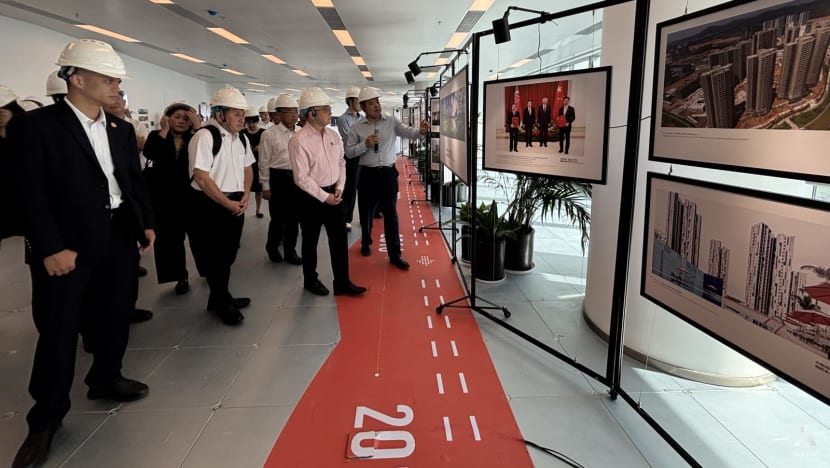
According to trade data from January to July this year, cited by Mr Wang, trade between Guangdong and Singapore reached 96 billion yuan (US$13.4 billion).
Beyond trade, bilateral cooperation has expanded to sectors such as advanced manufacturing, the digital economy, intellectual property rights protection, education and healthcare.
Mr Gan and Mr Wang also reaffirmed the “All-Round High-Quality Future-Oriented Partnership” - officially elevated in March 2023 when President Xi Jinping and then-Prime Minister Lee Hsien Loong upgraded bilateral ties during Mr Lee’s official visit to Beijing.
KNOWLEDGE CITY AS THE BRIDGE
The CSGKC has served as a key landing pad for Singapore companies to access the Greater Bay Area.
Mr Gan visited companies within the CSGKC, accompanied by Senior Minister of State for Trade and Industry and for Culture, Community and Youth Low Yen Ling.
At DBS Technology China (DTC), Mr Gan raised the possibility of staff exchanges between Singapore and China.
DTC was established in 2023 and soft launched in August 2024. The wholly owned subsidiary of DBS is the group’s third technology hub after Singapore and Hyderabad, India, set up to drive technological breakthroughs and strengthen links between China and Singapore.
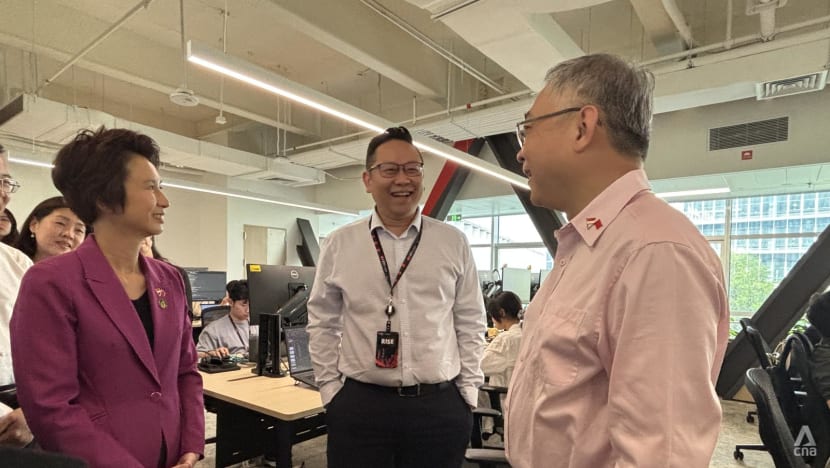
The Knowledge City is a state-level bilateral cooperation project between China and Singapore, and a key pillar of the Guangdong-Hong Kong-Macao Greater Bay Area’s innovation drive.
Spanning 232 square kilometres in Guangzhou’s Huangpu district, it is designed to house about one million residents and attract high-tech industries and international talent.
CSGKC has drawn a total investment of 570 billion yuan over 15 years, with average annual growth of 16.2 per cent in the past five years, according to Mr Wang.
The area now hosts nearly 60,000 market entities, including more than 100 Singapore enterprises.
Mr Gan and Ms Low also visited the NUS Guangzhou Research Translation and Innovation Institute (NUS GRTII), which aims to foster international collaboration, industrial innovation and talent exchange.
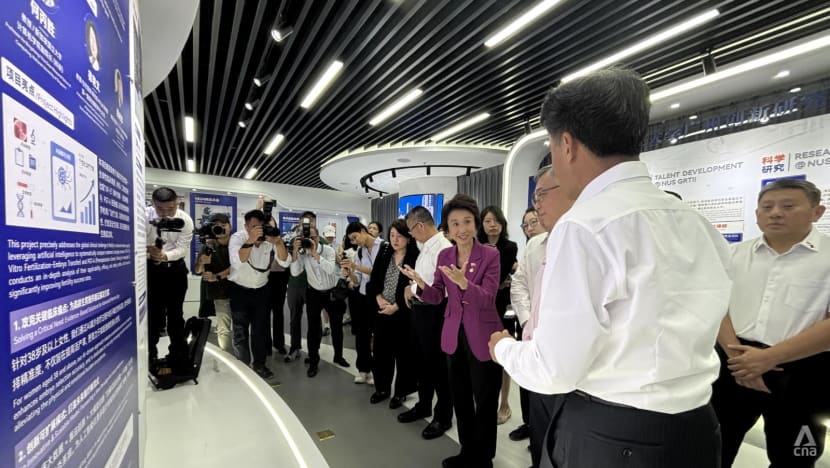
The delegation also toured a farm run by Singapore agri-tech start-up Singrow.
Its co-founder and CEO Bao Shengjie told CNA that the CSGKC has provided them with crucial policy support, industry linkages and an innovation ecosystem.
Mr Bao said that the practice of Singrow is a vivid example of the complementarity and win-win cooperation between Singapore and China in agricultural technology.
“By combining Singapore’s research strengths with China’s industrial base and market potential, and leveraging the high-quality platform of the Knowledge City, future solutions are being nurtured to safeguard food security and enhance agricultural efficiency.”
“Singapore is not an agricultural country, but because of a collaboration with China, we are able to develop this technology, implement it, and now multiply it to the rest of the world,” Mr Gan commented during his meeting with Mr Wang.
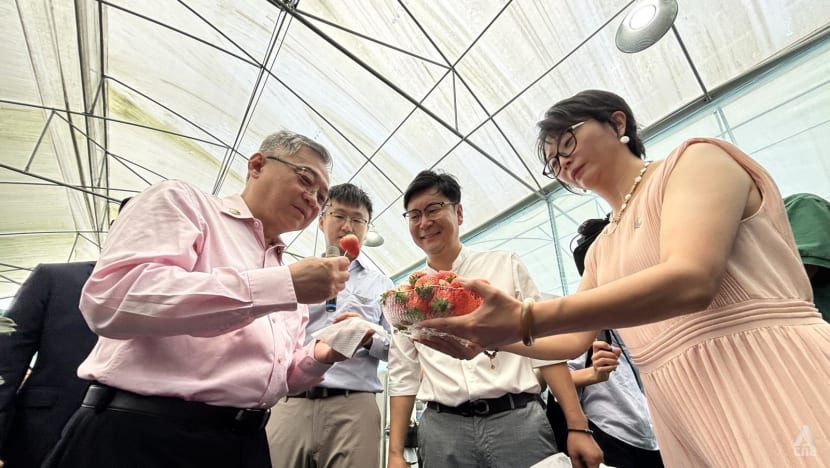
Alejandro Reyes, Adjunct Professor at the University of Hong Kong, said the Knowledge City’s development reflects how Singapore-China cooperation has evolved since the Suzhou Industrial Park in the 1990s.
“At that stage, the flow of expertise was largely one-way,” he said.
“Today, the balance of interaction – the knowledge and capacity building – is far more symmetrical.”
Singapore and China currently have three government-to-government projects - the Suzhou Industrial Park established in 1994, Tianjin Eco-City launched in 2008, and the Chongqing Connectivity Initiative launched in 2015.
CHALLENGES SPARK FRESH OPPORTUNITIES
Mr Gan also underscored the importance of collaboration amid global economic uncertainty.
“Given the uncertain global environment today, because of the tariff framework that is emerging, it’s important for countries to come together to explore more opportunities for collaboration and to strengthen our bilateral relationship,” he said.
“The global economy will undergo significant restructuring and shifts. Supply chains will be reorganised and there will be challenges, but there are also opportunities.”
Chong Ja Ian, associate professor of political science at the National University of Singapore, said Singapore’s involvement in the Greater Bay Area has become more pressing.
“The imperative to do so is now greater given the uncertainties surrounding the US market, which has historically been another key source of economic opportunity for Singapore,” he said.
Sports could be another area of collaboration between Singapore and Guangdong.
China will host the 15th National Games from Nov 9 to 21, across Guangdong, Hong Kong and Macao - the first time the event will be jointly held in the province.
Mr Wang welcomed Singaporeans to attend the Games as part of broader tourism exchanges, while Mr Gan said Singapore is also looking for opportunities to collaborate further with Guangdong on culture and sports.
Travel between the two sides has been brisk. In 2024, more than 1 million Guangdong tourists visited Singapore – up 87.4 per cent from a year earlier – while over 622,000 Singaporeans travelled to Guangdong, an increase of 73 per cent.
